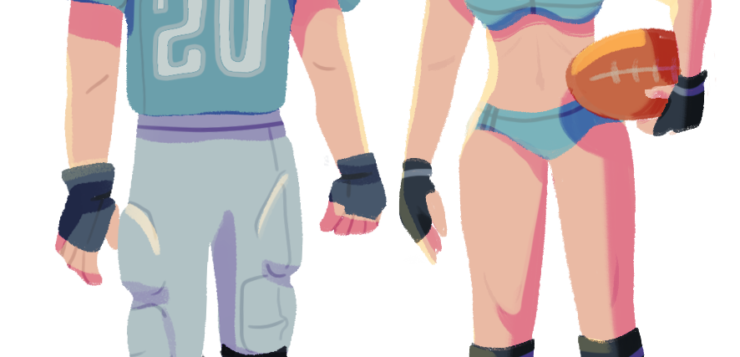To some extent, athletes always have and always will be sex symbols. The chiselled bodies, the fame, the money, what more could you want? But what differentiates male and female athletes is the ways in which the sexualisation of female athletes inhibits them from doing their job and being valued for it.
The hypersexualisation of women and misogyny go hand in hand. David Beckham might be called sexy in the tabloids when spotted with his top off, but he’s also recognised as a prolific and proficient footballer. Women however are sexualised in any and all contexts, because our sexuality and sexual appeal is placed above any other signifiers. Our bodies and our appearance is frequently named, if not explicitly then implicitly, as our chief attributes in life. So while a male athlete is allowed to be both attractive and good at his job, female athletes are reduced to what their sport does for the male gaze.
Sexism exists everywhere in sport. From ring girls and cheerleaders to the fact that any sports league in which women play has the precursor ‘women’s‘ because the default is always male, sport—like the world in which it exists—is patriarchal and thrives on hypermasculinity. The credibility of women’s sports is already diminished by its forceful existence in parallel to men’s, but the overwhelming sexualisation of female athletes is incredibly harmful to any fair sportsmanship. Female athletes are looked at like models because there’s an inherent assumption that they’re not good enough to function as athletes on their own.
When the women’s American football league first launched, there was one condition to it being televised: unlike the heavy protective padding of men’s American football, the women were forced to wear bikinis, moving the focus of the game off the sport and the incredibly hard work put into it by the athletes, and onto their appearance. Not only is it hard for the athletes to compete properly and do their job, but it objectifies them, ultimately discouraging others from trying their hand at the sport. What’s the point in putting all that sweat, blood and tears into your athleticism if at the end of the day, you’ll be reduced to some Sports Illustrated cover model? The game in itself is ridiculed by the tiny costumes they are forced to prance around in as men ogle their bodies, all the while thinking about the “real” men’s football they’ll watch later in the day.
Not only are they sexualised, but if women in sport fail to live up to the expectations of a sexy female body, their achievements in the sector are minimised. Take Simone Biles for example, one of the most decorated gymnasts of all time. After posing for the covers of Vogue and Time Magazine, she was flooded with hate comments over her broad shoulders and strong abs. They said that being too muscly is masculine, and that nobody will want a woman like that. She should slim down if she wants anyone to like her. The thing is, that strong chest and those strong shoulders make her the best at the game, and that is sexy. Her power is sexy. But most importantly, she doesn’t exist for you. She doesn’t need to be sexy to be of value. Neither does any other woman. It is not our sole purpose in life to serve the male gaze, and until the sexualisation of female athletes stops, women’s sport will never be taken seriously.




